Europe News
First British tourists allowed back into North Korea tell BBC what they saw
Lorem ipsum dolor sit amet, consectetur adipisicing elit, sed do eiusmod tempor incididunt ut labore et dolore magna aliqua.

Don’t insult the leaders. Don’t insult the ideology. And don’t judge.
These are the rules tour guides read out to Western tourists as they prepare to drive across the border into North Korea, arguably the most secretive and repressive country in the world.
Then there is the practical information. No phone signal, no internet, no cash machines.
“The North Koreans aren’t robots. They have opinions, goals, and a sense of humour. And in our briefing we encourage people to listen to and understand them,” says Rowan Beard, who runs Young Pioneer Tours, one of two Western companies which resumed trips to the country last week, after a five-year hiatus.
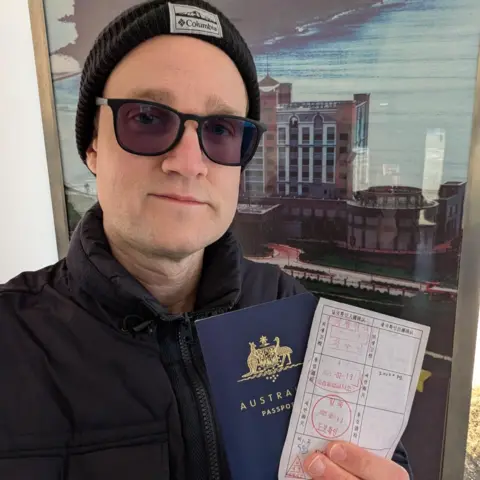
North Korea sealed its borders at the outset of the pandemic, shutting out diplomats, aid workers and travellers, and making it nearly impossible to know what was happening there.
Since then, it has further isolated itself from most of the world, relying on support from Russia and China. Many doubted whether Westerners would ever be allowed back.
But after years of cajoling and several false starts, Rowan and some other tour leaders were given the green light to restart operations. He pulled together a group of eager travellers in just five hours, desperate to not miss the opportunity. Most were vloggers and travel addicts, some wanting to tick the final country off their list, along with the odd North Korea enthusiast.
Last Thursday the tourists, from the UK, France, Germany and Australia, drove over the border from China into the remote area of Rason for a four-night trip.
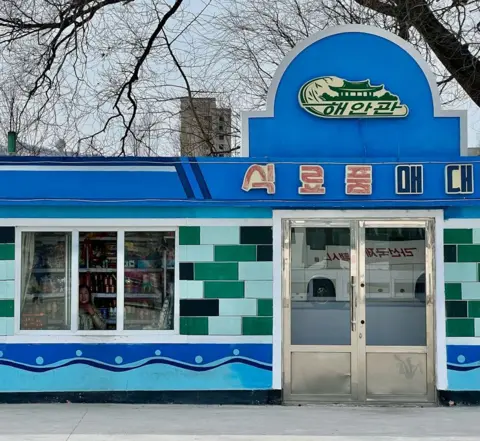
Among them was 28-year-old British YouTuber Mike O’Kennedy. Even with its reputation, he was startled by the extreme level of control. As with all trips to North Korea, the tourists were escorted by local guides, who followed a strict, pre-approved schedule. It included carefully choreographed trips to a beer factory, a school, and a new, fully stocked pharmacy.
Ben Weston, one of the tour leaders from Suffolk, likened visiting North Korea to “being on a school trip”. “You can’t leave the hotel without the guides,” he said.
“A couple of times I even had to let them know when I wanted to use the bathroom,” said Mike. “I’ve never had to do that anywhere in the world.”
Despite the chaperoning, Mike was able to spot snippets of real life. “Everyone was working, it didn’t feel like anyone was just hanging out. That was kind of bleak to see.”
On his trip to the school, a group of eight-year-olds performed a dance to animations of ballistic missiles hitting targets. A video of the spectacle shows girls and boys with red neckties, singing, while explosions flare on a screen behind them.

For now, tourists are being kept well away from the capital Pyongyang. Greg Vaczi from Koryo Tours, the other tour company allowed back in, admits the current itinerary lacks the “big-hitting monuments” of Pyongyang. He suspects authorities have chosen Rason as their guinea pig because the area is relatively contained and easy to control.
Set up as a special economic zone, to trial new financial policies, it operates as a mini capitalist enclave inside an otherwise socialist state. Chinese businesspeople run joint enterprises with North Koreans, and can travel in and out fairly freely.
Joe Smith, a seasoned North Korea traveller and former writer for the specialist North Korea platform NK News, was there on his third trip. “I feel like the more times you visit the less you know. Each time you get a little peek behind the curtain, which just leaves you with more questions,” he said.
Joe’s highlight was a surprise off-agenda visit to a luxury goods market, where people were selling jeans and perfumes, along with fake Louis Vuitton handbags and Japanese washing machines, probably imported from China. Here, the tourists were not allowed to take photos – an attempt to hide this consumer bubble from the rest of the country, they suspected.
“This was the only place people weren’t expecting us,” Joe said. “It felt messy and real; a place North Koreans actually go. I loved it.”
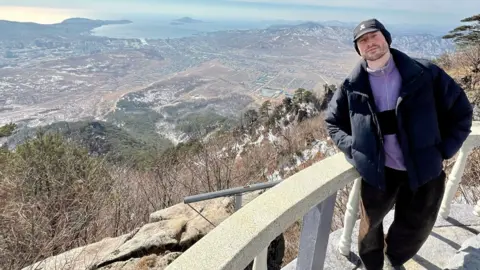
But according to the experienced tour leaders, the group’s movements were more restricted than on previous trips, with fewer opportunities to wander the streets, pop into a barbershop or supermarket, and talk to locals.
Covid was often cited as the reason, said Greg from Koryo Tours. “On the surface they are still concerned. Our luggage was disinfected at the border, our temperatures were taken, and about 50% of people are still wearing masks.” Greg cannot work out whether the fear is genuine, or an excuse to control people.
It is thought Covid hit North Korea hard, though it is difficult to know the extent of the suffering.
Local guides repeated the government line that the virus entered the country in a balloon sent over from South Korea, and was swiftly eradicated in 90 days. But Rowan, who has been to North Korea more than 100 times, sensed that Rason had been impacted by the tough Covid regulations. A lot of Chinese businesses had closed, he said, and their workers had left.
Even Joe, the experienced North Korea traveller, commented on how dilapidated the buildings were. “Places were dimly lit and there was no heating, apart from in our hotel rooms,” he said, noting a trip to a cold, dark and deserted art gallery. “It felt like they opened the doors just for us.”
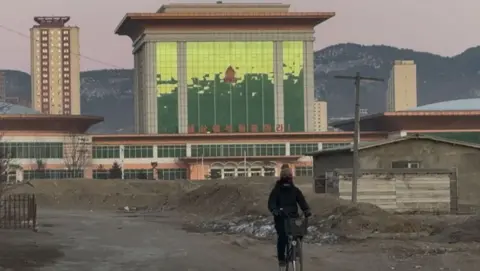
The regime’s photographs might make North Korea look clean and shiny, Joe said, but in person you realise “the roads are awful, the pavements are wobbly, and the buildings are weirdly constructed”. His hotel room was old-fashioned and filthy, he said, resembling “his grandma’s living room”. The whole window was cracked.
“They’ve had five years to fix things. North Koreans are so sensitive about what they show tourists. If this is the best they can show, I dread to think what else is out there”, he said. Most of the country is kept well hidden, with more than four in 10 people believed to be undernourished and needing help.
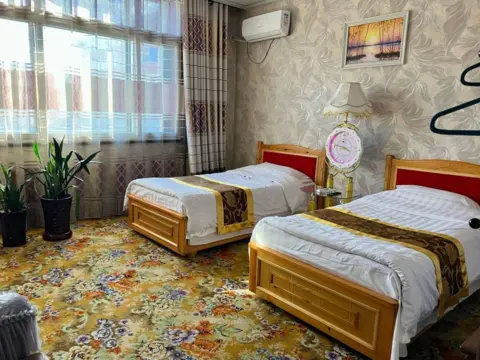
One of the few chances tourists in North Korea get to interact with local people is through their guides, who sometimes speak English. On these recent trips they were surprisingly well-informed, despite the regime’s intense propaganda machine and information blockade. This is probably because they speak to the Chinese businesspeople who come and go, said Greg.
They knew about Trump’s tariffs and the war in Ukraine – even that North Korean troops were involved. But when Joe showed a photo from Syria, his guide was unaware President Assad had been toppled. “I carefully explained that sometimes when people don’t like their leader, they rise up and force them out, and at first he didn’t believe me.”
Such conversations need to be delicately handled. Strict laws prevent North Koreans from speaking freely. Ask or reveal too much and the tourists might put their guide or themselves at risk.
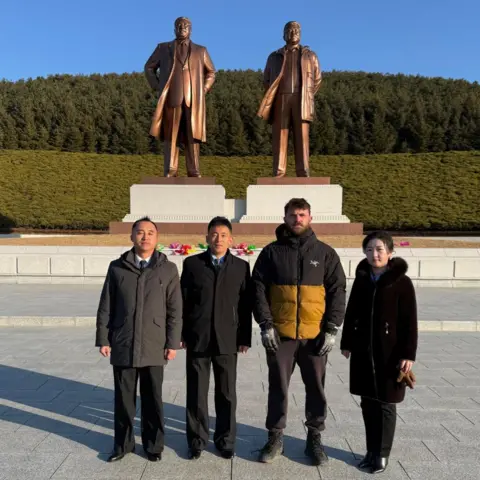
Mike admits there were times this made him nervous. On a trip to a North Korea-Russia Friendship House, he was invited to write in the visitors’ book. “I went blank and wrote something like ‘I wish the world peace.’ Afterwards my guide told me that was an inappropriate thing to write. That made me paranoid,” he said.
“Generally, the guides did a great job of making us feel safe. There were just a couple of moments when I thought, this is bizarre.”
For Greg from Koryo Tours, these interactions bring a deeper purpose to North Korea tourism: “North Koreans get the chance to engage with foreigners. This allows them to come up with new ideas, which, in a country this closed, is so important.”
But tourism to North Korea is contentious, especially as travellers have been allowed back before aid workers and most Western diplomats, including the UK’s. Critics, including Joanna Hosaniak from the Citizens Alliance for North Korean Human Rights, argue these trips mainly benefit the regime.
“This is not like tourism in other poor countries, where local people benefit from the extra income. The vast majority of the population don’t know these tourists exist. Their money goes to the state and ultimately towards its military,” she said.
One conversation has stuck in YouTuber Mike’s head. During his trip to the school, he was surprised when a girl, after meeting him, said she hoped to visit the UK one day. “I didn’t have the heart to tell her that her chances were very, very slim,” he said.
Taken From BBC News
Europe News
From Shadows to Power in the West

Paris (Imran Y. CHOUDHRY) :- Former Press Secretary to the President, Former Press Minister to the Embassy of Pakistan to France, Former MD, SRBC Mr. Qamar Bashir analysis : When Zohran Mamdani declared that he was not apologetic for being Muslim, immigrant, or young, he did more than assert personal pride. Speaking in New York, a city that hosts the United Nations and anchors global finance, he gave voice to a generational shift that has been quietly building across Western democracies. For decades, immigrants—particularly Muslims and people of color—were advised to soften identity, mute faith, and avoid visibility in exchange for conditional acceptance. Mamdani rejected that logic outright. His message was simple and disruptive: visibility is not a risk to manage; it is a civic right. That declaration resonated far beyond city limits because it named a shared experience millions recognize but were taught not to articulate publicly.
This refusal to remain invisible marks a turning point in immigrant political psychology. The old bargain promised tolerance in exchange for silence, but it never delivered equality. A younger generation has decided that restraint does not produce belonging; participation does. Across the United States, Canada, the United Kingdom, and Europe, immigrant and Muslim leaders are stepping into public life without apology, claiming rights already guaranteed by constitutions but unevenly honored by societies. What makes this moment consequential is not a change in law, but a change in posture. The question is no longer whether immigrants can assimilate quietly, but whether democracies will accept citizens who insist on full and visible membership.
The backlash has been swift and revealing. In the United States, chants of “go back to your country” have re-entered political discourse, often directed at citizens—naturalized or native-born—who happen to be nonwhite or Muslim. The phrase collapses under constitutional scrutiny. The Fourteenth Amendment is unambiguous: anyone born or naturalized in the United States is a citizen entitled to equal protection. There is no legal hierarchy between a white immigrant from Germany and a brown immigrant from Pakistan if both hold citizenship. The Constitution does not recognize ancestry, religion, or skin color as criteria for belonging. When exclusionists invoke “we” against “they,” they are not making a lawful claim; they are expressing an ideological preference unsupported by constitutional order.
The same contradiction appears across Western societies. In the United Kingdom, citizenship law makes no distinction between a citizen of Irish or Polish descent and one whose family came from Somalia or India. In France, republican principles formally reject ethnic or religious hierarchies. In Canada, multiculturalism is embedded in public policy. Yet the rhetoric of “we” and “they” persists. This reveals the true fault line: not law versus immigration, but law versus an imagined nation defined by race and culture rather than citizenship. The demand that immigrants leave—even when legally indistinguishable from any other citizen—exposes anxiety about status, not threats to legality.
That anxiety intensifies when immigrants move from invisibility to competition. For decades, immigrant labor was tolerated, even welcomed, so long as it remained concentrated in low-status sectors—driving taxis, cleaning offices, harvesting crops, staffing hotels. Western economies depend heavily on this work. But the discomfort grows when immigrants and their children compete openly for political office, executive authority, and intellectual leadership. The issue is not presence; it is parity. The shift from tolerated utility to equal competition unsettles assumptions about who is entitled to lead.
Economic data underscores this dynamic. Immigrants make up nearly one-fifth of the U.S. labor force and are overrepresented in essential blue-collar jobs. At the same time, more than a quarter of foreign-born workers are employed in high-skill fields such as medicine, engineering, and technology. This two-ended presence disrupts stereotypes of immigrants as permanent dependents. They are not merely sustaining economies from below; they are contesting power at the top. The resulting tension is often reframed as cultural conflict, but its roots lie in competition over opportunity and influence.
Demography adds another layer. Muslim and immigrant communities across the West are younger on average than white majorities and tend to have higher birth rates, largely because of age structure. Research consistently shows these gaps narrow with education and income over time, yet demographic momentum is politically potent. Rather than discuss convergence, populist movements amplify fear, casting ordinary population change as existential threat. Against this narrative, the new immigrant leadership emphasizes citizenship over biology. Belonging, they argue, is not inherited by bloodline but exercised through participation.
Misunderstandings about law and culture further inflame the debate. In the UK, for example, sharia councils are often portrayed as parallel legal systems undermining state authority. In reality, they function primarily as voluntary religious mediation bodies in personal matters and have no power to override national law. The controversy illustrates how easily fear replaces fact. The emerging immigrant leaders are not demanding legal exceptionalism; they are demanding equal protection and dignity within existing constitutional frameworks.
Crime statistics are similarly distorted. Variations in arrest and incarceration rates across groups reflect complex factors—age distribution, socioeconomic deprivation, neighborhood effects, and policing practices. Simplistic narratives that equate minority presence with criminality ignore these realities. The unapologetic generation understands this history of distortion, which is why its rhetoric centers on due process, constitutional rights, and equal treatment rather than appeals for tolerance.
What Mamdani’s words crystallized is the end of managed identity. Earlier generations believed safety lay in invisibility. Today’s leaders argue that invisibility never guaranteed safety—only silence. They replace caution with confidence: know your rights, claim your space, and compete openly. This posture is not radical; it is constitutional. It insists that democratic promises apply without qualification.
The significance of this moment lies in its transatlantic scope. From New York to London, from Toronto to Paris, immigrant and Muslim voices are echoing the same refusal: no apology for faith, origin, or age. This is why the reaction has been intense. The shadows are emptying. Communities once encouraged to hide are stepping into public life with assurance.
The challenge facing Western democracies is therefore stark. Citizenship either means equality under law, or it becomes a racialized privilege. If constitutions are taken seriously, there can be no lawful “we” empowered to expel a “they” among fellow citizens. As unapologetic immigrants step into the light, the meaning of belonging must expand to match the law. If it does not, the contradiction will haunt Western democracies far more persistently than immigration itself.
Europe News
Turkey host the COP31 after reaching compromise with Australia

Belem (Imran Y. CHOUDHRY):- Australia will not hold next year’s UN climate summit, Australia will allow Türkiye to host COP31 next year but Australia will lead negotiations there.
Climate Minister Chris Bowen revealing Australia was willing to cede hosting rights to Türkiye in exchange for it handing him the reins of the negotiations and cementing a major role for the Pacific at the summit.
There had been a growing expectation that Australia would drop its bid to host COP31 in Adelaide as it struggled to convince Türkiye to pull out of the contest.

Under UN rules, if the two countries were unable to strike a deal, then the meeting location would automatically revert to Germany, which hosts the United Nations body responsible for the Paris Agreement.
This unusual arrangement has taken observers by surprise. It is normal for a COP president to be from the host country and how this new partnership will work in practice remains to be seen.

Despite this, there will be relief among countries currently meeting at COP30 in the Brazilian city of Belém that a compromise has been reached as the lack of agreement on the venue was becoming an embarrassment for the UN.
Australia has pushed hard to have the climate summit in the city of Adelaide, arguing that they would co-host the meeting with Pacific island states who are seen as among the most vulnerable to climate change and rising sea levels.
Turkey, which has proposed hosting COP31 in the city of Antalya, felt that they had a good claim to be the host country as they had stood aside in 2021 and allowed the UK to hold the meeting in Glasgow.
If neither country was willing to compromise then the meeting would have been held in the German city of Bonn, the headquarters of the UN’s climate body.
As a result of discussions at COP30, a compromise appears to have been reached.
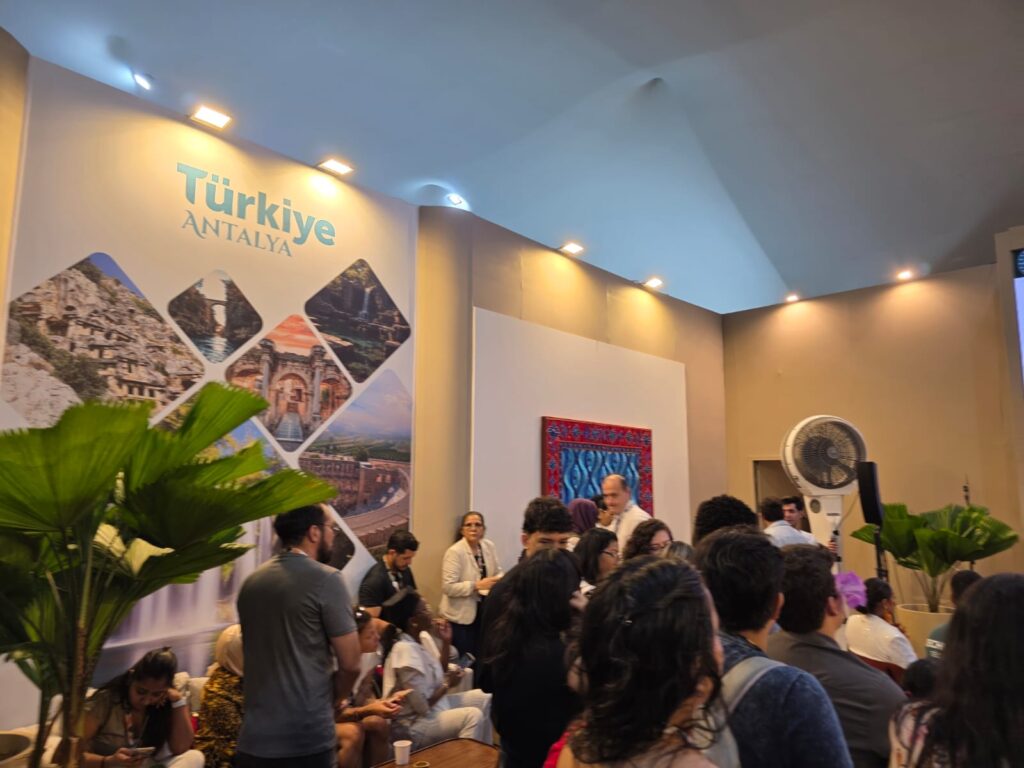
This includes pre-COP meeting will be held on a Pacific island, while the main event is held in Turkey.
Australian Minister believes having a COP president not from the host country will work and that he will have the considerable authority reserved for the president of these gatherings. As COP president of negotiations, I would have all the powers of the COP presidency to manage, to handle the negotiations, to appoint co-facilitators, to prepare draft text, to issue the cover decision,” he said.
He also confirmed to Turkey will also appoint a president who will run the venue, organise the meetings and schedules.
Australia’s climbdown will be embarrassing for the government of Mr Albanese, after lobbying long and hard to win support among the other nations in the Western Europe group.
The compromise will have to be ratified by more than 190 countries gathered here for COP30 in Belem, Brazil.
Photos @ Imran Y. CHOUDHRY
Europe News
Bioeconomy and Small Businesses Take Center Stage at COP30

Belem ( Imran Y. CHOUDHRY):- United Nations Climate Change Conference COP30 continue in Belem, Brazil to talks and dialogues for plains to strict roles and regulations.
Outside of the venue lots of different events host by different organisation and companies. One of the Bioeconomy and Small Businesses Take Center Stage at COP30 Organized by Sebrae in Pará, the En-Zone will be the international showcase of entrepreneurship and sustainability in the Amazon during the Conference.
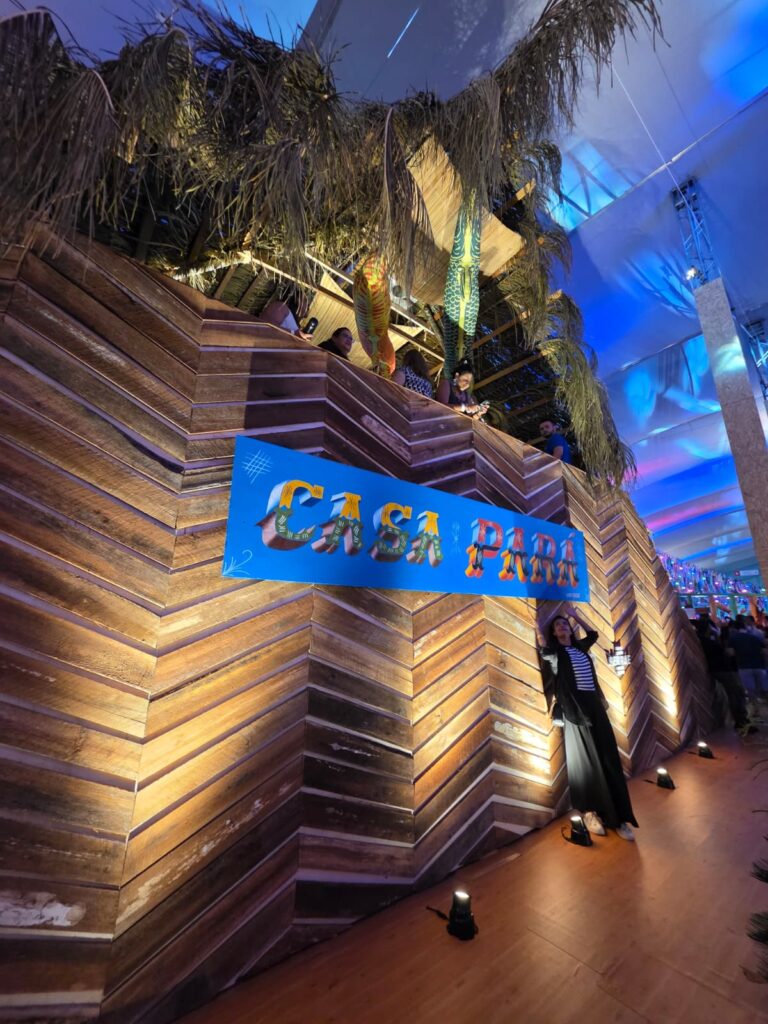
Visitors and residents of Belém have the opportunity to see firsthand the entrepreneurship that makes a diference in the lives of Amazonians and respects the forest. During the 30th Conference of the Parties on Climate Change of the UN (COP 30), Sebrae in Pará is promoting the
Entrepreneurship Zone (En-Zone), which will be open to the public from November 10th to 21st, in the parking lot of the
Belém Porto Futuro I Urban Park, with free admission.
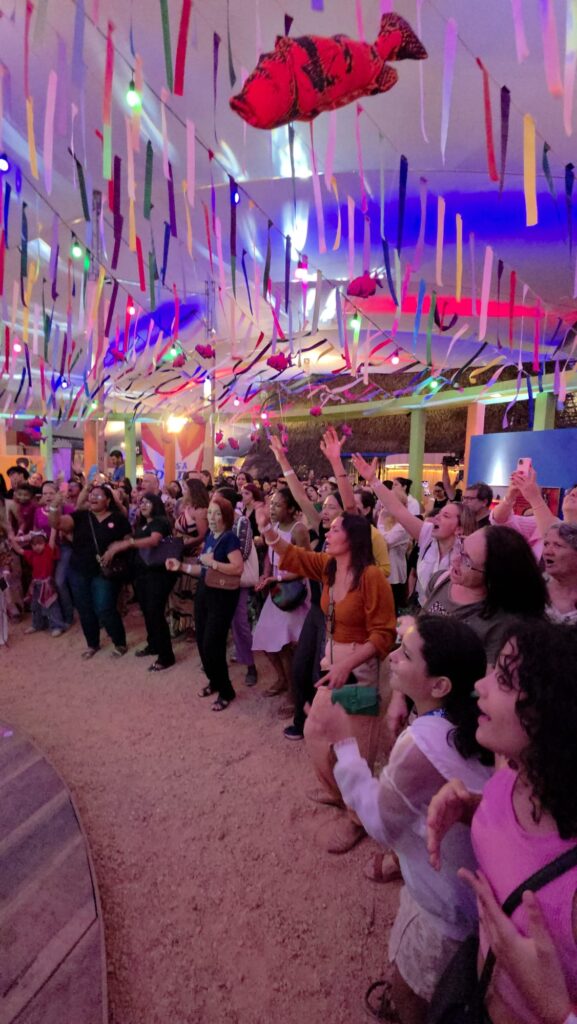
More than an exhibition space, the En-Zone is a hub of connections that highlights the leading role of small Amazonian businesses and
reinforces Sebrae’s role as an articulator of the new green economy. In an area of almost 17,000 square meters, it houses a store with products
from 250 businesses from all Brazilian biomes, the BioMarket store, Casa Pará, training opportunities, immersive spaces to promote national
tourism, a food court with restaurants, and a stage for musical programming.
With the theme “Living Amazon – The Future Revolves Here,” En-Zone ofers a sensory journey featuring works by Amazonian artists, miriti installations, sculptures, and interactive panels. The artistic curation highlights the muralist Sebá Tapajós, internationally recognized for portraying the forest in vibrant colors. At night, the scenic lighting creates an immersive and Instagrammable atmosphere, enhancing the Amazonian aesthetic and inviting public interaction.
“The Amazon Rainforest is at the centre of global debates about the future of the planet. Therefore, nothing is more fitting than showcasing a vibrant Amazon that preserves traditions, harbors immeasurable natural wealth, and generates income for those who live in and from it. That’s why Sebrae is leading a movement to position small businesses at the heart of sustainable development,” says Rubens Magno, Superintendent
Director of Sebrae in Pará.
En-Zone is an initiative of Sebrae/PA, with Claro Empresas as a connectivity partner, sponsorship from Hydro and Sicredi, and institutional support from the Municipality of Belém, the Government of Pará, and the Federal Government.
To see the complete En-Zone programme and register to visit the space, visitors should download the En-Zone SuperApp, available for Android and Apple. The Digital Agency, ofering Sebrae services to entrepreneurs, will also be integrated into the app.
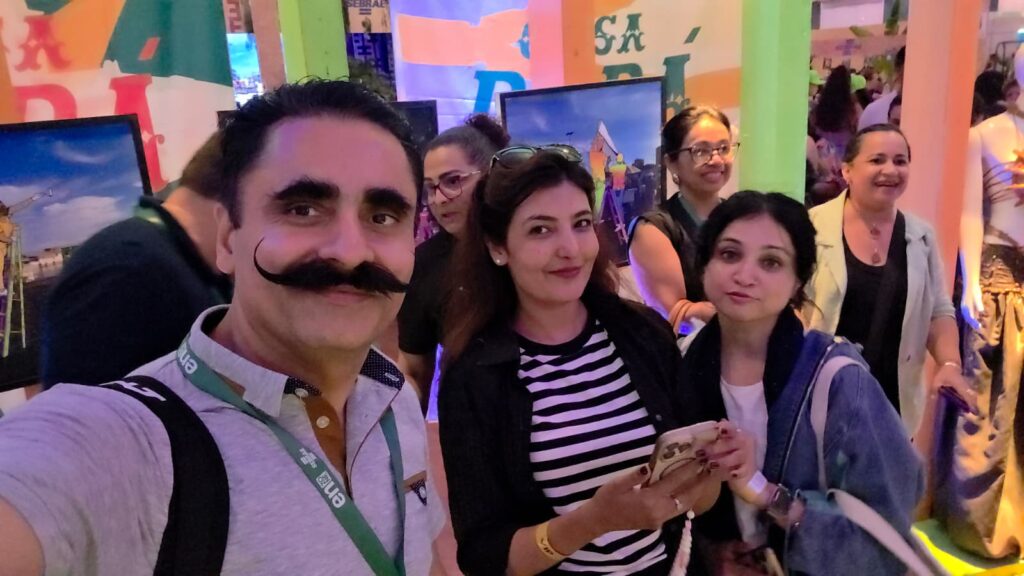
Brazil BioMarket, the name of Sebrae’s collaborative store, is a living showcase of sustainable and innovative entrepreneurship during COP30.
Between November 10th and 21st, attendees of the global climate conference will have the opportunity to meet approximately 250 small businesses that connect with new ways of thinking about development without compromising care for nature and people.
The selected small businesses represent all six Brazilian biomes, in the segments of food and beverages, fashion and accessories, crafts and decoration, beauty and cosmetics. In addition to exhibiting and selling Brazilian products, the store aims to strengthen the regional economy,
generating employment, income, and visibility for entrepreneurs.
The initiative also involves the participation of the Association of Socio-bioeconomic Businesses of the Amazon (ASSOBIO), contracted to operate the store, and Vimer Retail Experience, which developed the brand and the concept of experiential retail that the space will provide. The idea is that the entrepreneurs’ stories will be “told” through the display of the products that the store will ofer. In addition to the physical space, some entrepreneurs will have their products available in an exclusive online store within the Mercado Livre platform, with free access. This initiative ofers entrepreneurs another alternative for digital presence, complementing the physical store experience with a broader catalog more
accessible to consumers throughout Brazil.
The Loja Brasil BioMarket also has a unit in the Green Zone.
The host state of COP30 is highlighted at Casa Pará, one of the most emblematic spaces in the En-Zone. With 500 m², the space aims to promote a cultural and sensory immersion in the Amazon, as well as reflections on relevant themes, focusing on sustainable design, hospitality,
and the circular economy, through a rich program of exhibitions by artists from Pará, performances, discussion panels, and daily debates.
Among the cultural attractions are a special exhibition featuring popular manifestations such as the “big-headed” figures, pierrots, and masks by
Mestre Vital, as well as the Miriti Pavilion, conceived by Guá Arquitetura and Atelier Miriti Sustentabilidade, which presents miriti as an Amazonian social technology, and works by Éder Oliveira, Erica Saraiva, Roberta Carvalho, Marinaldo Santos, and Walda Marques.
This will be the first time that Casa Pará opens its doors in its own territory. The space was born during the Tiradentes Creative Week in October of this year.
The program also includes regenerative tourism experiences, which are based on the premise of transforming an environment for the better, with workshops on bioeconomy, reforestation, and experiences in riverside communities, in addition to the promotion of sustainable Brazilian tourist destinations, such as the Combu Route, a reference in community-based tourism and local production.
Other immersive tourism experiences can be enjoyed at the Visit Brasil Center, a partnership between Sebrae/PA and Embratur. The center will be an interactive space focused on promoting sustainable tourism and authentic experiences in the country, through the use of technologies
such as artificial intelligence and augmented reality, allowing for the exploration of Brazilian ecosystems in 3D. In the “Feel Brasil” area, visitors ill have the opportunity to discover more than 100 sustainable experiences created by small entrepreneurs.Gastronomy on the rise
Pará’s cuisine is one of the most original and celebrated in the world. As expected, this striking feature of the local culture will receive due prominence at the Gastronomic Festival, which will bring together renowned Amazonian chefs in creations that combine tradition and innovation.
In the Em-Zone food court, the richness of Pará’s and the Amazon region’s gastronomy is highlighted. The menu was designed to ofer a diverse and inclusive experience, bringing together typical dishes, regional, oriental, natural and Amazonian cuisine, as well as pasta and
healthy options.
In addition to sampling Amazonian delicacies, visitors can discover bioproducts from Brazilian biomes produced by national entrepreneurs,
which will be on display at the Brasil Biomarket store, as well as bioproducts from the Sustenta e Inova Program, an international cooperation initiative coordinated by Sebrae/PA and financed by the European Union. Cultural Programme
At En-Zone, fun and sustainability always go hand in hand. One of the attractions will be the Amazon Wheel, a 90-meter Ferris wheel powered by solar energy and with 18 gondolas, one of which is accessible to people with disabilities. The venue will ofer exclusive experiences, such ashappy hour at sunset, regional cuisine, an ice cream parlor, a cofee shop, and a sustainable souvenir shop.
Visitors to En-Zone can enjoy free musical performances by Amazonian artists that reflect and echo the musical identity of the Northern region.
Brega, techno brega, calypso, carimbó, and lambada are among the styles selected by the Sebrae curation team, with programming on a stage
set up at Em-Zone.
The Brazilian Army, through the Northern Military Command, will also be present with an exhibition highlighting the role of the Armed Forces in the Amazon, combining sustainability, technology, and innovation. The space will showcase projects, equipment, and educational work from theBelém Military College, as well as exhibiting equipment that assists its military corps in the preservation and scientific development of the
region, such as the SABER M60 radar and the RBS 70 missile launcher.
Journalists and digital influencers from Brazil and around the world will be able to count on the Media Hub, an exclusive and fully equipped structure, designed especially for them to produce and distribute, in real time, content on strategic topics such as sustainable entrepreneurship, bioeconomy, and the Amazonian business environment.
The “Sebrae Communication House” during COP30, as the media hub is being called, will operate from November 10th to 21st, at the Belém Porto Futuro I Urban Park. Access for communicators will be free and will be done directly through the oficial En-Zone app.
En-Zone has a Digital Agency integrated into the En-Zone COP30 app, ofering exclusive content for entrepreneurs. This feature, called “Conecta Negócios” (Connect Businesses), will only be accessible to users with a National Registry of Legal Entities (CNPJ).
To make the En-Zone space functional, measures were adopted for carbon neutrality, management of waste generated during COP, and the promotion of accessibility to the site. This demonstrates Sebrae/PA’s commitment to adopting ESG (environmental, social, and governance) practices, consolidating the event as an example of sustainability and inclusion.
At En-Zone, there will be a welcome team on standby to handle various situations that may arise throughout the 12 days of the event. The space has been structured with a focus on humanized service, prioritizing the well-being and safety of all participants.
Among the services ofered are first aid for cases of allergies, pain or discomfort, as well as providing insect repellent, sunscreen, and even emergency sewing services for damaged clothing or accessories, ensuring that the experience of visitors and guests is not compromised.
Accessibility and Inclusion The space will also pay special attention to accessibility, with the presence of a sign language interpreter and audio description, ensuring that people with disabilities have the same opportunities for participation and interaction at the event. The aim is to make the Welcome Area a welcoming, inclusive and safe environment for everyone.
During En-Zone, visitor flow will be organized through the En-Zone COP30 Super App, an application that functions as a digital profile, facilitating access to areas of interest and optimizing the consumption experience within the space. Available free of charge for Android and iOS systems, the application will accompany the public, speakers, and entrepreneurs throughout the event, simplifying entry and exit control, and
digitizing functions such as tickets via QR Code.Areas of Operation En-Zone is one of Sebrae’s areas of operation at COP30. The entity also has activities in the Green Zone, Vila Domos, and Casa Brasil, in addition to being one of the executors of the City in Motion Circuit and presenting Global Citizen in Belterra. It was also one of the supporters of the Global Citizen Amazon Festival, which took place last Saturday, at Mangueirão, in Belém, organizing the food service entrepreneurs of the event.
-

 Europe News12 months ago
Europe News12 months agoChaos and unproven theories surround Tates’ release from Romania
-

 American News12 months ago
American News12 months agoTrump Expels Zelensky from the White House
-

 American News12 months ago
American News12 months agoTrump expands exemptions from Canada and Mexico tariffs
-

 American News12 months ago
American News12 months agoZelensky bruised but upbeat after diplomatic whirlwind
-

 Art & Culture12 months ago
Art & Culture12 months agoThe Indian film showing the bride’s ‘humiliation’ in arranged marriage
-

 Pakistan News8 months ago
Pakistan News8 months agoComprehensive Analysis Report-The Faranian National Conference on Maritime Affairs-By Kashif Firaz Ahmed
-

 Art & Culture12 months ago
Art & Culture12 months agoInternational Agriculture Exhibition held in Paris
-

 Politics12 months ago
Politics12 months agoUS cuts send South Africa’s HIV treatment ‘off a cliff’












